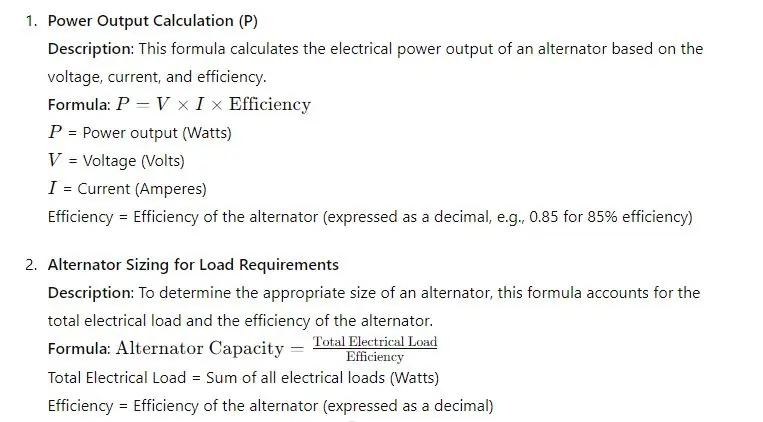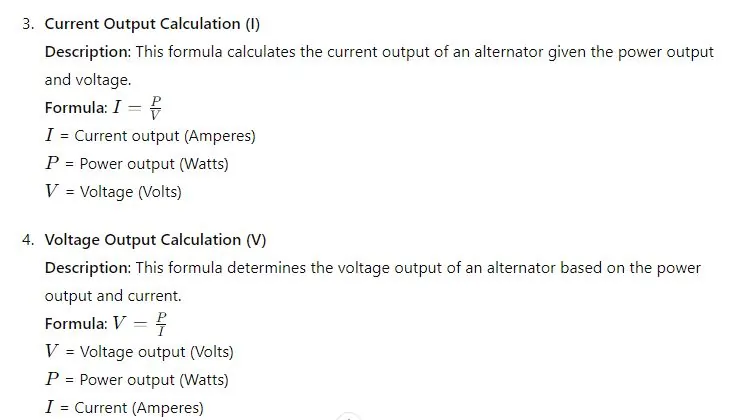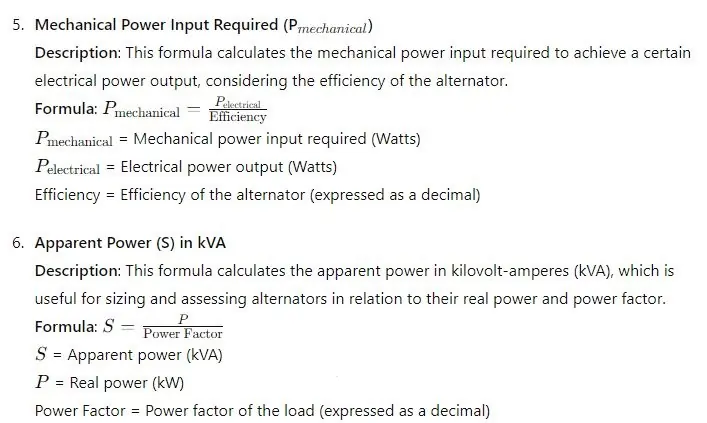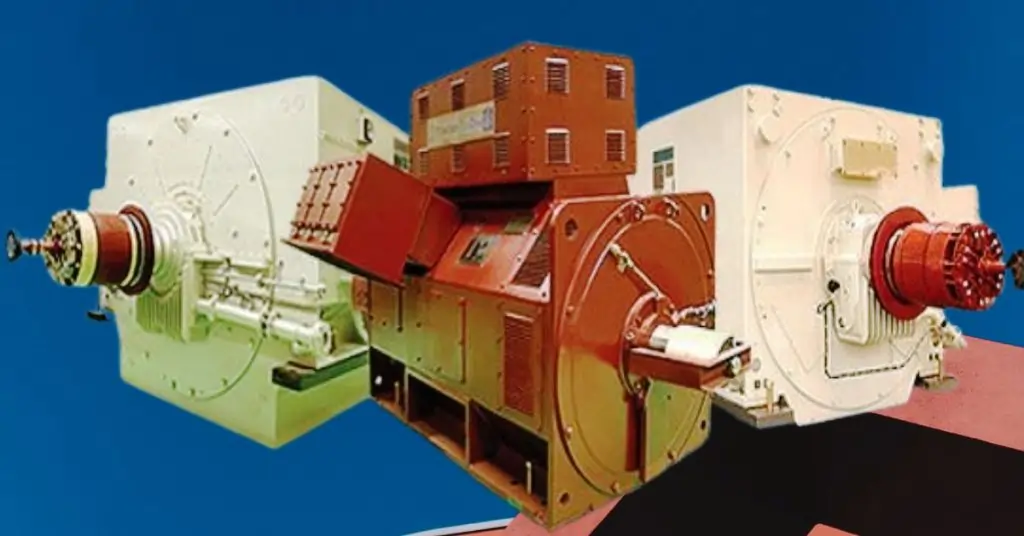Alternators
Alternators play a critical role in marine applications, ensuring the reliable generation of electricity essential for various onboard systems. Understanding the key components that make up an alternator can help in selecting the best products for marine generators.
In this blog post, we will explore the top 7 essential components of alternators, including the rotor, stator, and voltage regulator, and how they contribute to efficient power generation. Additionally, we will highlight the leading global brands in the industry, such as Bosch, Denso, Leroy Somer, and AVK, renowned for their high-quality alternators. High-quality alternators are vital for maintaining the performance and reliability of marine generators, which are crucial for safe and efficient maritime operations. Join us as we delve into the intricacies of alternators and provide insights into choosing the best options for your marine applications.
Understanding Alternators in Marine Applications
Definition and Function: Alternators are electrical devices that convert mechanical energy into electrical energy in the form of alternating current (AC). On ships, they are typically coupled with engines to generate electricity, powering essential systems such as navigation, communication, lighting, and other onboard equipment. The alternator consists of key components including the rotor, stator, and voltage regulator, all working together to ensure efficient electricity production.
Importance in Marine Applications: Reliable alternators are crucial for marine operations as they ensure a steady supply of electricity, which is vital for the safety and functionality of a vessel. High-quality alternators minimize the risk of power failures, which can lead to critical issues at sea. They provide consistent and dependable power to all essential systems, enabling smooth and uninterrupted marine operations. The durability and efficiency of alternators directly impact the overall performance and reliability of marine generators, making them indispensable in maritime environments.
Alternator Capacity Calculation Formulas



The 7 Most Essential Components of Alternators
Rotor
- Description and Function: The rotor is a rotating part of the alternator that creates a magnetic field. It consists of a core with coils of wire wrapped around it, which is energized by direct current (DC) to produce a magnetic field.
- Importance in Generating Magnetic Fields: The rotor’s magnetic field is crucial as it interacts with the stator to induce alternating current (AC). The strength and stability of the magnetic field directly affect the efficiency and output of the alternator.
Stator
- Role in Producing Alternating Current (AC): The stator is the stationary part of the alternator that contains coils of wire in which AC is generated. It surrounds the rotor and captures the magnetic field created by the rotor.
- Interaction with the Rotor: The interaction between the rotor’s magnetic field and the stator’s coils induces AC, which is then used to power various electrical systems on the vessel. This interaction is the core process of electricity generation in an alternator.
Slip Rings
- Function in Providing a Continuous Electrical Connection: Slip rings are conductive rings connected to the rotor, allowing current to flow to and from the rotor while it rotates. They maintain a continuous electrical connection between the stationary and rotating parts of the alternator.
- Importance: Slip rings are essential for transferring the DC required to energize the rotor without disrupting its rotation, ensuring efficient operation of the alternator.
Bearings
- Importance in Ensuring Smooth Rotation: Bearings support the rotor and allow it to rotate smoothly with minimal friction. They play a critical role in maintaining the mechanical integrity and longevity of the alternator.
- Types and Maintenance Tips: There are various types of bearings, including ball bearings and roller bearings. Regular maintenance, such as lubrication and inspection for wear and tear, is vital to prevent failures and ensure optimal performance.
Rectifier
- Role in Converting AC to Direct Current (DC): The rectifier is a set of diodes that converts the AC generated in the stator to DC, which is used to charge the battery and power DC systems on the vessel.
- Importance: This conversion is essential for applications that require DC, ensuring that the electrical systems onboard have the correct type of power.
Voltage Regulator
- Function in Maintaining Stable Voltage Output: The voltage regulator controls the amount of current supplied to the rotor, thereby regulating the alternator’s output voltage. It ensures that the voltage remains within specified limits, protecting electrical systems from fluctuations and potential damage.
- Importance: A stable voltage output is crucial for the safety and efficiency of electrical systems, preventing overcharging or undercharging of batteries and other components.
Cooling System
- Importance of Thermal Management in Alternators: The cooling system dissipates heat generated by the alternator during operation. It can include air cooling or liquid cooling mechanisms, depending on the design and application.
- Function: Proper thermal management prevents overheating, which can cause damage to the alternator and reduce its lifespan. Efficient cooling ensures that the alternator operates within safe temperature limits, maintaining its performance and reliability.
How Can Reverse Power Occur in an Alternator?
Reverse power occurs when power flows back into the alternator instead of flowing from it to the load. This can happen due to several factors, leading to potential damage if not properly managed.
1. Prime Mover Failure
When the prime mover (such as an engine or turbine) fails, the alternator can act as a motor and start drawing power from the bus bar. This may happen if the engine runs out of fuel or if there is a malfunction in the power controller, causing reverse power flow.
2. Synchroscope Issues
During synchronization, if the synchroscope rotates slowly and closes at the wrong time, the alternator will start drawing power from the bus bar instead of supplying it. This synchronization error can result in reverse power.
3. Loss of Excitation
Reverse power can also occur due to a loss of excitation in the alternator. Without proper excitation, the alternator’s ability to generate power diminishes, causing it to draw power from the grid.
4. Consequences and Protection
Reverse power can lead to overheating, mechanical stress, and damage to the generator. To prevent these issues, a Reverse Power Relay (RPR) is used to monitor power flow. If reverse power is detected, the RPR disconnects the alternator from the grid, preventing further damage.
Leading Global Brands in Alternator Manufacturing
| Brand | Overview | Key Products and Innovations |
|---|---|---|
| AVK | AVK is a renowned manufacturer known for its robust and reliable alternators, particularly in industrial and marine applications. | AVK offers a range of high-capacity alternators designed for heavy-duty usage, incorporating advanced cooling systems and enhanced durability features. |
| Stromberg | Stromberg has a rich history and solid reputation in the marine industry, known for its innovative solutions and reliable performance. | Stromberg alternators are notable for their efficiency and longevity, designed specifically to meet the demanding needs of marine environments. |
| Leroy Somer | A leading brand under Nidec Corporation, Leroy Somer is known for its comprehensive range of alternators that combine advanced technology with reliability. | Leroy Somer products are pivotal in marine applications, offering high efficiency, rigorous testing standards, and a wide range of power outputs. |
| Other Noteworthy Brands | Several other manufacturers also provide high-quality alternators for marine and industrial use. | Bosch: Known for reliability and performance. Denso: Advanced technology and efficiency. Valeo: High standards and performance. Marathon Electric: Robust and reliable. Mecc Alte: Efficient and advanced technology. Hyundai Corporation: Quality and reliability. TD Power Systems Limited: High-quality and durability. Stamford: High quality under Cummins Generator Technologies. |
Choosing the Right Alternator for Marine Applications
Selecting the right alternator for marine applications is crucial for ensuring reliable power generation and efficient operation of onboard systems. Here are the key factors to consider and expert tips to help you make an informed decision.
Factors to Consider
- Size: The physical dimensions of the alternator must fit within the available space in the engine room. Ensure that the chosen alternator can be easily installed without compromising other components.
- Power Output: Assess the total electrical load requirements of your vessel. The alternator should have sufficient capacity to meet the peak demand of all onboard systems, including navigation, communication, lighting, and auxiliary equipment.
- Durability: Marine environments are harsh, with exposure to saltwater, humidity, and vibrations. Choose alternators built with high-quality materials and robust construction to withstand these conditions. Look for features like corrosion-resistant coatings and sealed bearings.
- Brand Reputation: Opt for alternators from reputable manufacturers known for their quality and reliability. Brands like AVK, Stromberg, Leroy Somer, Bosch, Denso, and others have a proven track record in the marine industry.
Expert Tips
- Conduct a Load Analysis: Before selecting an alternator, perform a thorough load analysis of your vessel’s electrical needs. Consider both the continuous and peak power requirements to ensure the alternator can handle the load without strain.
- Check Compatibility: Ensure the alternator is compatible with your engine and existing electrical systems. Verify voltage and current specifications to avoid potential mismatches that could lead to inefficiencies or damage.
- Evaluate Cooling Systems: Marine alternators often operate in high-temperature environments. Choose an alternator with an efficient cooling system, whether air-cooled or liquid-cooled, to prevent overheating and ensure consistent performance.
- Maintenance and Service: Consider the ease of maintenance and availability of spare parts. Opt for brands that offer comprehensive support, including manuals, service kits, and customer service.
- Warranty and Support: Select alternators that come with a robust warranty and good after-sales support. This provides peace of mind and ensures that any issues can be promptly addressed by the manufacturer.
- Consult with Experts: If unsure, consult with marine electrical experts or engineers who can provide personalized recommendations based on your vessel’s specific needs and operating conditions.
Maintenance and Troubleshooting Tips
| Aspect | Description |
|---|---|
| Regular Maintenance | Best Practices for Extending Alternator Life |
| Inspection | Regularly inspect the alternator for signs of wear, corrosion, or damage. Check connections and wiring for any signs of looseness or fraying. |
| Cleaning | Keep the alternator clean and free from dust, debris, and oil. Use a soft brush and appropriate cleaning agents to remove contaminants. |
| Lubrication | Ensure bearings are properly lubricated as per manufacturer guidelines. Use the recommended type and amount of lubricant. |
| Flexible Coupling | Inspect the flexible coupling for signs of wear, misalignment, or damage. Ensure it is correctly aligned and securely fastened. |
| Electrical Connections | Verify that all electrical connections are secure and free from corrosion. Clean terminals and apply a suitable anti-corrosive agent. |
| Cooling System | Ensure the cooling system (air or liquid) is functioning correctly. Clean air vents and check coolant levels regularly. |
| Voltage Output | Periodically check the alternator’s voltage output to ensure it is within the specified range. Use a multimeter to monitor performance. |
| Professional Servicing | Schedule regular professional servicing to perform thorough inspections and maintenance tasks that require specialized tools or expertise. |
| Common Issues and Solutions | How to Diagnose and Fix Typical Alternator Problems |
|---|---|
| Issue: No Charge or Low Charge | Solution |
| Diagnosis | Check battery voltage with the engine off and running. Verify all connections are secure. Test the alternator output using a multimeter. |
| Solution | If the alternator is not producing adequate voltage, check for worn-out brushes, a faulty voltage regulator, or damaged wiring. Replace faulty components as needed. |
| Issue: Overcharging | Solution |
| Diagnosis | Measure the voltage output. Overcharging is indicated by a voltage significantly higher than the recommended level. |
| Solution | Inspect the voltage regulator for proper function. Replace the regulator if it is faulty. Ensure the battery is not defective or incorrectly rated. |
| Issue: Unusual Noises | Solution |
| Diagnosis | Listen for grinding, whining, or squealing sounds from the alternator. Check for loose or damaged components. |
| Solution | Replace worn-out bearings or damaged flexible couplings. Ensure the flexible coupling is in good condition and properly aligned. |
| Issue: Flickering Lights | Solution |
| Diagnosis | Check for inconsistent alternator output voltage. Inspect electrical connections and wiring for looseness or corrosion. |
| Solution | Secure all connections and clean any corroded terminals. Test and replace the voltage regulator if necessary. |
| Issue: Battery Draining | Solution |
| Diagnosis | Verify that the alternator is providing sufficient charge. Check for parasitic drains when the engine is off. |
| Solution | Ensure all electrical components are turned off when not in use. Inspect for short circuits or malfunctioning components. Repair or replace as needed. |
What is Excitation and Where Does It Take Place?
Excitation refers to the process of supplying electrical current to the field windings of a generator or alternator to produce a magnetic field. This magnetic field is essential for inducing voltage in the stator windings, allowing the generator to produce electricity. Proper excitation ensures stable voltage output and efficient power generation.
Where Does Excitation Take Place?
Excitation occurs in the rotor or field winding of a generator or alternator. In brushless systems, it typically involves an exciter and a rotating rectifier assembly. The exciter produces initial AC power, which is then converted into DC by the rotating rectifiers to energize the main rotor. This energized rotor generates a rotating magnetic field, which interacts with the stator to produce the output voltage. Excitation systems are vital in power generation, ensuring that the generator maintains consistent voltage levels under varying load conditions.
FAQ on Alternators
Q: What is the primary function of an alternator in marine applications?
A: It converts mechanical energy into electrical energy.
Q: What are the key components of an alternator?
A: Rotor, stator, slip rings, bearings, rectifier, voltage regulator, and cooling system.
Q: How can I ensure the longevity of my alternator?
A: Regular cleaning, inspecting connections, and checking the flexible coupling.
Q: What are common signs of alternator issues?
A: No charge, overcharging, unusual noises, flickering lights, and battery draining.
Conclusion
Maintaining and troubleshooting your alternator is crucial for ensuring reliable power generation in marine applications. By regularly inspecting key components such as the flexible coupling, bearings, and electrical connections, and by adhering to best practices for cleaning and lubrication, you can extend the lifespan and efficiency of your alternator. Understanding common issues and their solutions, like addressing voltage inconsistencies and unusual noises, will help you keep your alternator in optimal condition. Prioritizing high-quality alternators from reputable brands ensures dependable performance, ultimately enhancing the safety and functionality of your marine operations.
